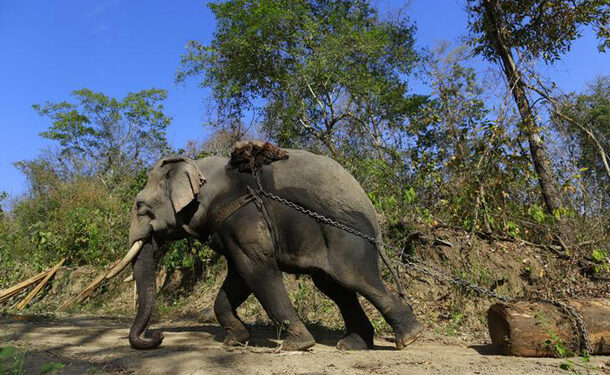RANGOON — With a crackdown announced on the illegal timber trade—and a proposed nationwide logging ban by the end of the fiscal year in March 2017—seizures of illegally cut logs have exceeded 10,000 tons in the first quarter from April to June.
Myo Min, director of the Forestry Department in the Ministry of Natural Resources and Environmental Conservation, maintains, however, that trends are continuing to move in a positive direction. Based on the current figures, he expects seizure quantities for this fiscal year to be lower than the 46,153 tons seized during the 2015-16 fiscal year.
From the beginning of April until June 23, 12,844 tons of timber were seized, according to the ministry’s figures. The most commonly seized log varieties were teak, followed by other hardwoods. The largest hauls were in Sagaing Division, at nearly 3,450 tons, followed by over 2,178 tons in Karenni State and 1,406 tons in Pegu Division.
“Along the Irrawaddy River, we have inspection teams checking for illegally cut logs and detaining culprits, and we are conducting ambushes in different states and divisions in cooperation with the forestry police. We’re providing more security for every forest in the country,” Myo Min said.
The ministry said it has filed 614 criminal cases related to 2,545 interventions during this three-month period. During the entire 2015-16 fiscal year, 2,246 cases were filed out of 13,003 interventions.
Burma lost an average of 1.7 percent of its forests annually from 2010-15, leaving total forest cover at 45 percent (around 29 million hectares), according to the UN Food and Agriculture Organization. Fifteen years before, this stood at 65 percent, the agency said.
Government data for the fiscal year ending in March 2013, reported by Reuters, put Burma’s total timber exports past 1.24 million cubic tons, generating more than US$1 billion, of which teak comprised $359 million. However, it is generally thought that this was far below the actual quantity of timber traded—and money made—on the black market.
Since 2014, the legal logging sector—whose methods, under the state-owned Myanmar Timber Enterprise, have received a large part of the blame for Burma’s deforestation—has been restricted according to an annual quota. Log exports were then suspended from April the same year.
After the formation of the new government in April, Minister of Natural Resources and Environmental Conservation Ohn Win declared that a nationwide ban on logging would be imposed by the end of the current fiscal year in March 2017.
This followed initial media reports in April that the ban would be be imposed immediately, due largely to a statement from Saw John Shwe Ba, managing director at the ministry, that the government had “decided to stop logging completely.”
Environmental groups blamed the uncertainty this caused for spurring a temporary flurry of logging activity in different parts of the country.
Baba Cho, a consultant to the Myanmar Timber Merchants Association, said the government needed to enhance law enforcement to prevent illegal logging, which continues at significant rates across the country.
“Last year, some forest police were murdered in this country. If law enforcement remains weak in certain areas, mafia-type logging networks will only go stronger,” he said.
“Some have blamed cronies [for deforestation] but, as can be easily seen, villagers around [logging] areas also participate because of poverty. We have to consider such things when trying to enforce a stop,” he said.
Baba Cho added that, for logging to be successfully curbed, the government cannot work alone but must also collaborate with locals and stakeholder organizations.

















